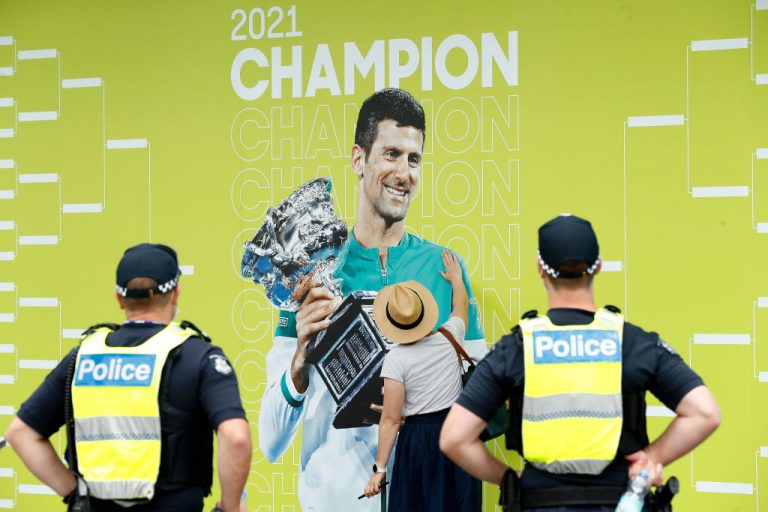Tennis superstar Novak Djokovic has spoken out for the first time since being deported from Australia, doubling down on his decision to not accept a Coronavirus Disease 2019 (COVID-19) vaccine, even if it costs him chances to win enough titles to be considered the greatest tennis player ever.
In an exclusive interview with the BBC aired on Feb. 15, the number one on the ATP world ranking list spoke candidly about his stance to stay COVID-19 vaccine-free, even if this would cost him the opportunity to compete at any more Grand Slam tournaments and his “Greatest of all time” (GOAT) records.
READ MORE:
- Djokovic Deported Out of Australia, Losing Out on Australian Open
- Novak Djokovic’s Fate Remains Unclear as Discussions of Tennis Star’s Deportation Continue
- Australian Open Reverses T-shirt Ban After Outcry Over Chinese Tennis Star Peng Shuai
“That is the price I’m willing to pay,” Djokovic said.
“But, ultimately,” BBC talk host Amol Rajan asked, “are you prepared to forego the chance to be the greatest player that ever picked up a racket, statistically, because you feel so strongly about this jab?”
Success
You are now signed up for our newsletter
Success
Check your email to complete sign up
“Yes,” the Serbian tennis star said. “I do,”
“But as things stand, if this means that you miss the French Open, is that the price you’re willing to pay?” Rajan kept pushing.
“Yes, that is the price that I’m willing to pay,” Djokovic said.
Rajan pressed, “And if it means that you missed Wimbledon this year, again, that is the price you’re willing to pay?”
Djokovic’s answer was a firm “Yes.”
“Why, why?” the BBC correspondent appeared puzzled.
“Because the principles of decision making on my body are more important than any title, or anything else.”
It was the first time Djokovic spoke out since he was expelled from the Australian Open last month after Health Minister Alex Hawke personally thwarted the Serbian tennis player’s ambitions to compete on the grounds that it might bolster public anti-vaccination sentiment.
The 34-year-old athlete thereby forewent the chance to set the record as the male tennis player having won the most Grand Slam titles. Djokovic’s counter in that category now sticks at 20.
Wryly, his foremost—fully vaccinated—rival, Spanish star Rafael Nadal was able to clutch the record by winning his 21st title in Melbourne amid Djokovic’s absence.
Future grand slams
“I understand that not being vaccinated today, I am unable to travel to most of the tournaments at the moment,” Djokovic said.
“Based on all the informations that I got, I decided not to take the vaccine as of today,” he said.
French authorities have already underlined that only fully vaccinated athletes may compete at the upcoming French Open tournament.
Djokovic faces two big stops ahead with Wimbledon in June and the U.S. Open in August, with his participation given the current guidelines is still very questionable.
The Australian deportation
Djokovic also described his encounter with Australian customs as “tough,” from the moment he set foot on Australian soil.
“It was very, very hard. While I was still at the airport, I couldn’t use my phone for three, four hours. I was lost, really, I didn’t know what was happening,” Djokovic recalled how officials with the Australian Border Forces had annulled his visa.
After winning his first interlocutory proceedings, Djokovic was temporarily granted access to the country and allowed to train, “But it was not the regular kind of training days that I would normally have prior to the Grand Slam competition,” he said.
“I had helicopters flying above every single training session that I had on Rod Laver Arena, cameras all over the place. Also, I felt that energy and that those looks from my colleagues and people that were in the tennis facility…that really hurt me a lot.”
“And I wasn’t going out in the media, because of what was previously said in respecting the legal process and respecting the Australian Open. But at that time, I really wanted to speak to everyone and give my explanation.”
Djokovic continued, “The reason why I was deported from Australia was because the Minister for Immigration (Alex Hawke) used his discretion to cancel my visa based on his perception that I might create some anti-vax sentiment in the country or in the city, which I completely disagree with.”

















